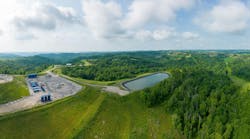Nick Snow
Washington Editor
Canadian oil sands could play an even larger supply role for the US, but the North American pipeline system will have to adjust to accommodate the additional supplies, James Burkhard, managing director of IHS-CERA Inc.'s global oil and gas group, told a US House Energy and Commerce subcommittee.
"The lack of significant pipeline capacity to transport Canadian oil beyond its traditional US Midwest market artificially deprives the broader US market of oil that is available," he said in written testimony to the Energy and Power Subcommittee on May 23 at a hearing on legislation that would establish a Nov. 1 deadline for the US Department of State to issue a decision on a proposed cross-border system.
"A more flexible and robust supply system is better able to manage unexpected supply or demand developments, which would be a big positive for the US economy and consumers," Burkhard said. "Oil producers in Canada—which include many American companies—would develop export markets in Asia if they are unable to broaden their reach into the US market."
Environmental issues surrounding oil sands development are controversial, but manageable, he continued. "Ongoing advances in technology and operational experience have demonstrated that environmental concerns—particularly greenhouse gas emissions—are being addressed," Burkhard said. "Life-cycle GHG emissions for the average oil sands product actually imported into the United States are just 6% higher than those from the average crude oil consumed in the US."
Other witnesses outlined benefits both of producing from Canada's oil sands in Alberta and of building TransCanada Corp.'s proposed Keystone XL project, which would transport the oil to Cushing, Okla., and on to US Gulf Coast refineries.
'Reliable, sustainable'
"The Keystone XL project is fundamentally about meeting the needs of US crude oil refiners—and hence US consumers—for a reliable and sustainable source of crude oil to either supplement or replace reliance on declining foreign supplies, without turning to greater reliance on Middle Eastern sources," said Alex Porbaix, president of TransCanada's energy and oil pipelines division.
"There can be little dispute that this purpose enhances US energy security at a critical juncture," Porbaix said, adding, "Moreover, the need for prompt approval of the Keystone XL project is particularly crucial today when US consumers are struggling to cope with the high cost of gasoline."
Stephen Kelly, assistant general president of the United Association of Plumbers and Pipe Fitters, said that the project would generate thousands of high-paying US construction jobs at a time when there's 20% unemployment in that industry.
"In addition, this project will produce a number of other important economic benefits, including jobs in related industries and hundreds of millions of dollars in state and local tax revenues," Kelly said, adding, "And finally, this project will substantially increase our nation's long-term energy security by enabling us to obtain more oil from our friends in Canada and less from the increasingly unstable and unreliable Middle East."
Former Alberta Energy Minister Murray Smith, who was also the province's first US diplomatic representative in Washington from 2005 to 2007, said that producing crude from Alberta's oil sands provides significant contributions to the US economy from the 470-ton trucks manufactured by Caterpillar in Illinois to US refinery and pipeline expansion projects.
Jobs created
"These expansions will process increased volumes of Alberta oil into major US markets," he said. "Multiple studies have placed job creation in excess of 13,000 direct and over 34,000 jobs in total just for pipeline expansion. This clearly demonstrates that Alberta oil delivers more economic value per barrel than any other barrel of oil imported into the US."
Oil companies in Canada spend more money on environmental controls than any other industry there, according to Smith. "Companies continue every day to improve the efficiency, cost and environmental sustainability of oil sands operations," he said. "Air quality in Fort McMurray exceeds Toronto 98% of the time and New York City 100% of the time. Carbon emissions from oil sands production differ only marginally from heavy oil production in Venezuela, Mexico, and the heavy oil of California."
Dan McFadyen, chairman of Alberta's Energy Resources Conservation Board, said that oil sands in the province are being developed under a rigorous and transparent regulatory framework based on sound science and continuous improvement. "Our integrated and comprehensive regulatory regime is founded on stringent legislation and regulations that take into account environmental, social and economic impacts as well as resource conservation and technical excellence," he said. "Or, to put it another way, the regulatory regime is designed to ensure the oil sands are developed in the public interest."
But other witnesses suggested that Canadian oil sands development and construction of pipelines to move more Canadian crude across the border and into the US could also create problems. Jeremy Symons, senior vice-president for conservation and education at the National Wildlife Federation, told the subcommittee that the Keystone XL project's actual purpose was to ship Canadian crude to US Gulf Coast refineries owned by foreign national oil companies for possible shipment overseas. "Big Oil's claims that this pipeline will help our energy security are a carefully fabricated mirage," he declared.
Randy Thompson, a farmer from Martell, Neb., said he and others are concerned that building a large oil pipeline across the Ogallala Aquifer could contaminate the Western Hemisphere's largest body of clean water. "We Nebraskans may be a little independent and bullheaded at times, but we're not uninformed," he said in his written testimony. "We have witnessed the results of other pipeline spills and associated problems throughout this country, and that's why we are wary of this proposed project. It's why we are asking you to slow down on this proposed bill and ensure the proper regulations and safety measures are in place."
More Oil & Gas Journal Current Issue Articles
More Oil & Gas Journal Archives Issue Articles
View Oil and Gas Articles on PennEnergy.com

